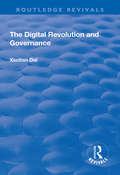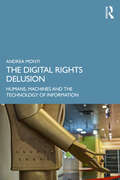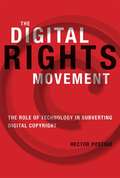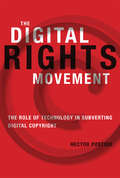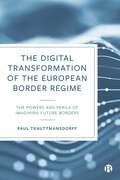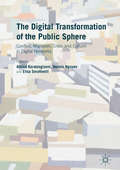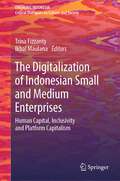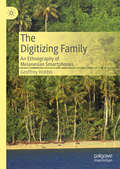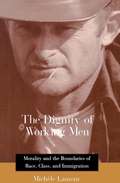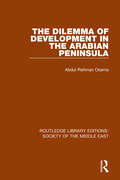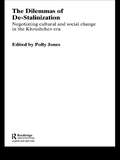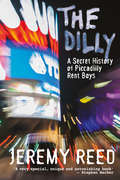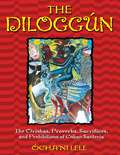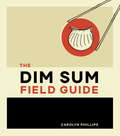- Table View
- List View
The Digital Reporter's Notebook
by Mark BlainePowerful storytelling engages the senses, and today, there are more accessible digital tools available for telling multimedia stories than ever before. The Digital Reporter’s Notebook teaches practical digital storytelling techniques that journalists can put into practice right away, using the technology they already have in their pockets. Mark Blaine demonstrates how to gather information and organize it into a successful multimedia story without losing sight of the essentials of good journalism. These forty brief chapters provide a versatile toolkit for multimedia journalists, including activities and exercises to build a strong foundation in digital storytelling. Readers will also want to try the interactive app, which includes videos and animations that bring the concepts and ideas in the book to life. Topics include: Lighting & Framing Collecting Sound Scene Setting & Relevant Detail Interview Techniques Story Structure File Management The Digital Reporter’s Notebook is ideal for online journalism courses and introductory reporting courses using a convergence approach.
The Digital Revolution and Governance (Routledge Revivals)
by Xiudian DaiThis title was first published in 2000. This text examines the politics of the digital age, looking at topics including new industrial policies, the implications of the Internet and global governance of innovation.
The Digital Rights Delusion: Humans, Machines and the Technology of Information
by Andrea MontiThis book examines the ever-increasing impact of technology on our lives and explores a range of legal and constitutional questions that this raises. It considers the extent to which concepts such as 'cyberspace' and 'digital rights' advance or undermine our understanding of this development and proposes a number of novel approaches to the effective protection of our rights in this rapidly evolving environment. Finally, it shows how the abuse of the adjective digital has demoted legal rights into subjective and individual claims. The work will be of particular interest to scholars of privacy, artificial intelligence and free speech, as well as policymakers and the general reader.
The Digital Rights Movement
by Hector PostigoThe movement against restrictive digital copyright protection arose largely in response to the excesses of the Digital Millennium Copyright Act (DMCA) of 1998. In The Digital Rights Movement, Hector Postigo shows that what began as an assertion of consumer rights to digital content has become something broader: a movement concerned not just with consumers and gadgets but with cultural ownership. Increasingly stringent laws and technological measures are more than incoveniences; they lock up access to our "cultural commons. " Postigo describes the legislative history of the DMCA and how policy "blind spots" produced a law at odds with existing and emerging consumer practices. Yet the DMCA established a political and legal rationale brought to bear on digital media, the Internet, and other new technologies. Drawing on social movement theory and science and technology studies, Postigo presents case studies of resistance to increased control over digital media, describing a host of tactics that range from hacking to lobbying. Postigo discusses the movement's new, user-centered conception of "fair use" that seeks to legitimize noncommercial personal and creative uses such as copying legitimately purchased content and remixing music and video tracks. He introduces the concept of technological resistance--when hackers and users design and deploy technologies that allows access to digital content despite technological protection mechanisms--as the flip side to the technological enforcement represented by digital copy protection and a crucial tactic for the movement.
The Digital Rights Movement: The Role of Technology in Subverting Digital Copyright (The Information Society Series)
by Hector PostigoThe evolution of activism against the expansion of copyright in the digital domain, with case studies of resistance including eBook and iTunes hacks.The movement against restrictive digital copyright protection arose largely in response to the excesses of the Digital Millennium Copyright Act (DMCA) of 1998. In The Digital Rights Movement, Hector Postigo shows that what began as an assertion of consumer rights to digital content has become something broader: a movement concerned not just with consumers and gadgets but with cultural ownership. Increasingly stringent laws and technological measures are more than incoveniences; they lock up access to our “cultural commons.”Postigo describes the legislative history of the DMCA and how policy “blind spots” produced a law at odds with existing and emerging consumer practices. Yet the DMCA established a political and legal rationale brought to bear on digital media, the Internet, and other new technologies. Drawing on social movement theory and science and technology studies, Postigo presents case studies of resistance to increased control over digital media, describing a host of tactics that range from hacking to lobbying.Postigo discusses the movement's new, user-centered conception of “fair use” that seeks to legitimize noncommercial personal and creative uses such as copying legitimately purchased content and remixing music and video tracks. He introduces the concept of technological resistance—when hackers and users design and deploy technologies that allows access to digital content despite technological protection mechanisms—as the flip side to the technological enforcement represented by digital copy protection and a crucial tactic for the movement.
The Digital Television Revolution: Origins To Outcomes (Palgrave Global Media Policy and Business)
by Michael StarksThis account of the global switch to digital television, from its origins to its emerging outcomes, provides an understanding of how digital television is converging with the Internet. It pictures a future in which the democratic role of the media, freedom of expression and democratic participation can be enhanced.
The Digital Transformation of the European Border Regime: The Powers and Perils of Imagining Future Borders
by Paul TrauttmansdorffThis book offers an in-depth investigation into the digitisation processes of Europe’s border regime. It shows how sociotechnical imaginations of future borders drive forward the expansion of databases in the European governance of mobility. With a focus on the European Union Agency eu-LISA, one of the most significant and rapidly advancing actors in the digital border regime, the book serves as a gateway to understanding the key agents, visions, technologies and practices at work. Asking broader questions about exclusion, discrimination, violence and mobility rights, this is an original contribution to our understanding of future borders in Europe.
The Digital Transformation of the Public Sphere: Conflict, Migration, Crisis and Culture in Digital Networks
by Athina Karatzogianni, Dennis Nguyen and Elisa SerafinelliBringing together contributions from the fields of sociology, media and cultural studies, arts, politics, science and technology studies, political communication theory and popular culture studies, this volume engages both with theoretical debates and detailed empirical studies, showcasing how the public sphere is transformed by digital media, and in turn how this digital public sphere shapes and is shaped by debates surrounding crisis, conflict, migration and culture. Case studies from Bulgaria, Nigeria, China, Greece, Italy, Cyprus, UK, Mexico and India are discussed in detail.
The Digital and Its Discontents (Electronic Mediations #62)
by Alexander R. Galloway Aden EvensA groundbreaking critique of the digital world that analyzes its universal technological foundations Whence that nagging sense that something in the digital is amiss—that, as wonderful as our devices are, time spent on smartphones and computers leaves us sour, enervated, alienated? The Digital and Its Discontents uniquely explains that worry and points us toward a more satisfying relationship between our digital lives and our nondigital selves, one that requires a radical change in the way we incorporate technology into our lives. Aden Evens analyzes universal technological principles—in particular, the binary logic—to show that they encourage certain ways of thinking while making others more challenging or impossible. What is out of reach for any digital machine is contingency, the ontological principle that refuses every rule. As humans engage ourselves and our world ever more through digital machines, we are losing touch with contingency and so banishing from our lives the accidental and unexpected that fuel our most creative and novel possibilities for living. Taking cues from philosophy rather than cultural or media theory, Evens argues that the consequences of this erosion of contingency are significant yet often overlooked because the same values that make the digital seem so desirable also make contingency seem unimportant—without contingency the digital is confined to what has already been thought, and yet the digital&’s ubiquity has allowed it to disguise this inherent sterility. Responsive only to desires that meet the demands of its narrow logic, the digital requires its users to practice those same ideological dictates, instituting a hegemony of thought and value sustained by the pervasive presence of digital mechanisms. Interweaving technical and philosophical concepts, The Digital and Its Discontents advances a powerful and urgent argument about the digital and its impact on our lives. Retail e-book files for this title are screen-reader friendly.
The Digitalisation of Anti-Corruption in Brazil: Scandals, Reforms, and Innovation (ISSN)
by Fernanda OdillaThis book investigates how digital technologies, such as social media and artificial intelligence, can contribute to combatting corruption in Brazil.Brazil, with its long history of scandals and abundant empirical data on digital media usage, serves as a perfect case study to trace the development of bottom-up and top-down digital anti-corruption technologies and their main features. This book highlights the connections between anti-corruption reforms and the rapid implementation of innovative solutions, primarily developed by tech-savvy public officials and citizens committed to anti-corruption efforts. The book draws on interviews with experts, activists and civil servants, as well as open-source materials and social media data to identify key actors, their practices, challenges and limitations of anti-corruption technologies. The result is a thorough analysis of the process of digitalisation of anti-corruption in Brazil, with a theoretical framework which can also be applied to other countries. The book introduces the concept of “integrity techies” to encompass social and political actors who develop and facilitate anti-corruption technologies, and discusses different outcomes and issues associated with digital innovation in anti-corruption.This book will be a key resource for students, researchers and practitioners interested in technologies and development in Brazil and Latin America, as well as corruption and anti-corruption studies more broadly.
The Digitalization of Indonesian Small and Medium Enterprises: Human Capital, Inclusivity and Platform Capitalism (Engaging Indonesia)
by Trina Fizzanty Ikbal MaulanaThis book examines the digitalization of Small and Medium Enterprises (SMEs) in Indonesia and its challenges in the context of an emerging economy and the Covid-19 crisis. During the Covid-19 pandemic, business digitalization became a must for a business to avoid collapse and people saw that digital transformation is a panacea for SMEs to help them survive and revive from the crises. Governments and other stakeholders in many countries including Indonesia have launched policies and programs to support SMEs. Transforming SMEs' conventional businesses into digitalized versions, however, is a complex issue influenced by various factors. These factors encompass both internal changes within the organization and external dynamics in the ecosystem in which they operate. This book, therefore, is a new approach towards understanding the digitalization of SMEs in Indonesia and includes contributions from scholars with different, multi-disciplinary perspectives and demonstrates that digital transformation of SMEs is not all about technology adoption but also involves other aspects such as social, economic, and public governance factors. It discusses opportunities and challenges of digital transformation of SMEs in Indonesia, such as digital talent, financial inclusion, platform capitalism, automation, government’s role, governance, open competition, and inclusive digital economy. The book is of interest to researchers and students of social economics, SMEs and entrepreneurship, human capital research, and economy and governance.
The Digitally Disposed: Racial Capitalism and the Informatics of Value (Electronic Mediations #61)
by Seb FranklinLocates the deep history of digitality in the development of racial capitalism Seb Franklin sets out a media theory of racial capitalism to examine digitality&’s racial-capitalist foundations. The Digitally Disposed shows how the promises of boundless connection, flexibility, and prosperity that are often associated with digital technologies are grounded in racialized histories of dispossession and exploitation. Reading archival and published material from the cybernetic sciences alongside nineteenth-century accounts of intellectual labor, twentieth-century sociometric experiments, and a range of literary and visual works, The Digitally Disposed locates the deep history of digitality in the development of racial capitalism.Franklin makes the groundbreaking argument that capital&’s apparently spontaneous synthesis of so-called free individuals into productive circuits represents an &“informatics of value.&” On the one hand, understanding value as an informatic relation helps to explain why capital was able to graft so seamlessly with digitality at a moment in which it required more granular and distributed control over labor—the moment that is often glossed as the age of logistics. On the other hand, because the informatics of value sort populations into positions of higher and lower capacity, value, and status, understanding their relationship to digitality requires that we see the digital as racialized and gendered in pervasive ways.Ultimately, The Digitally Disposed questions the universalizing assumptions that are maintained, remade, and intensified by today&’s dominant digital technologies. Vital and far-reaching, The Digitally Disposed reshapes such fundamental concepts as cybernetics, informatics, and digitality.
The Digitized Imagination: Encounters with the Virtual World
by Nalini RajanThe work explores the complex and profound implications of digital technology for a stunning variety of spaces, ranging from science and cinema to citizenship and bazaars. It maps the multiple ways in which the 'new' media rewrites the 'old', and the dilemmas and issues that they pitch - questioning, in turn, received notions of knowledge, legality, ethics, privacy, identity and community. The book argues that the old and the new media are neither radically different nor the same: while the mutability of a narrative, whether on the printed page or on a digitally recorded disk remains, there are intrinsic differences between print and digital print.
The Digitizing Family: An Ethnography of Melanesian Smartphones
by Geoffrey HobbisAt once a digital ethnography of smartphones and a classically conceived village-based ethnography, this book relocates the study of digital technologies to rural Melanesia, with a focus on the Lau of Malaita, Soloman Islands. In this ‘technography’, Geoffrey Hobbis studies the materiality and functional attributes of smartphones and their object biographies—modes of acquisition, maintenance, uses, limitations and the problems specific to this region in adopting and adapting smartphones in everyday life. As he examines the various uses of smartphones, as both telephone and multimedia device, Hobbis also explores the social and cultural transformations, the hopes and uncertainties, with which they are associated. Ultimately, in bringing together a study of digital technologies with classical anthropological theory, The Digitizing Family develops a theory of smartphones as kinship technologies and supercompositional objects.
The Dignity of Labour?: A Study of Childbearing and Induction (Routledge Revivals)
by Ann CartwrightOriginally published in 1979, this study looks at the experience of childbearing from three viewpoints: first and foremost from that of the childbearing women; but in addition it considers the views and experiences of midwives and consultant obstetricians.It examines the proportion of induced labours and questions who is induced, when, where and why and how. Comparisons are then made between induced and non-induced labours of mothers’ experiences of labour and delivery and then of the babies conditions and the early relationships between the mothers and babies. Women’s views of their experiences, their attitudes to the information they were given, and their choice for treatment at further pregnancies are then examined.In the final chapter induction policies and practices are reviewed in the light of women’s reactions to their experiences. The implications of the findings are discussed in relation to other innovatory and interventionist procedures and in the context of the women’s movement.
The Dignity of Resistance: Women Residents' Activism in Chicago Public Housing
by Roberta M. Feldman Susan StallThe Dignity of Resistance chronicles the four decade history of Chicago's Wentworth Gardens public housing residents' grassroots activism. This comprehensive case study explores why and how these African-American women creatively and effectively engaged in organizing efforts to resist increasing government disinvestment in public housing and the threat of demolition. Roberta M. Feldman and Susan Stall, utilizing a multi-disciplinary lens, explore the complexity and resourcefulness of Wentworth women's grassroots, organizing the ways in which their identities as poor African-American women and mothers both circumscribe their lives and shape their resistance. Through the inspirational voices of the activists, Feldman and Stall challenge portrayals of public housing residents as passive, alienated victims of despair. We learn instead how women residents collectively have built a cohesive, vital community, cultivated outside technical assistance, organizational and institutional supports, and have attracted funding - all to support the local facilities, services and programs necessary for the everyday needs for survival, and ultimately to save their home from demolition.
The Dignity of Working Men: Morality And The Boundaries Of Race, Class, And Immigration (Russell Sage Foundation Books at Harvard University Press)
by Michèle LamontMichèle Lamont takes us into the world inhabited by working-class men--the world as they understand it. Interviewing black and white working-class men who, because they are not college graduates, have limited access to high-paying jobs and other social benefits, she constructs a revealing portrait of how they see themselves and the rest of society. Morality is at the center of these workers' worlds. They find their identity and self-worth in their ability to discipline themselves and conduct responsible but caring lives. These moral standards function as an alternative to economic definitions of success, offering them a way to maintain dignity in an out-of-reach American dreamland. But these standards also enable them to draw class boundaries toward the poor and, to a lesser extent, the upper half. Workers also draw rigid racial boundaries, with white workers placing emphasis on the "disciplined self" and blacks on the "caring self." Whites thereby often construe blacks as morally inferior because they are lazy, while blacks depict whites as domineering, uncaring, and overly disciplined. This book also opens up a wider perspective by examining American workers in comparison with French workers, who take the poor as "part of us" and are far less critical of blacks than they are of upper-middle-class people and immigrants. By singling out different "moral offenders" in the two societies, workers reveal contrasting definitions of "cultural membership" that help us understand and challenge the forms of inequality found in both societies.
The Dignity of Working Men: Morality and the Boundaries of Race, Class, and Immigration
by Michele LamontThis study examines the way that working-class men both define themselves and the rest of society. The book analyzes the importance placed on moral standards and the rigid racial and class boundaries drawn by the men in their construction of their own definition of success.
The Dilemma of Development in the Arabian Peninsula (Routledge Library Editions: Society Of The Middle East Ser. #8)
by Osama Abdul RahmanThis book, first published in 1987 and by one of Saudi Arabia’s most distinguished academics, reviews the experience of the Arab oil producers in social, economic and political development in the key period of the Seventies and Eighties. It is broadly pessimistic about the prospects for future development and sceptical about past achievements. It argues that the ‘petro-bureaucracy’ in the Arabian Peninsula has failed to establish the basic principles of effective development because it has been mesmerised by the vast oil revenues it has attempted to administer. The book suggests that in many respects the oil revenues have obstructed serious development because they have made the Arabian economies totally dependent on one expendable resource and this has made them too vulnerable to external pressures and interests. Furthermore, the oil revenues have encouraged fantasy and wishful thinking which have skewed the development process and stimulated pseudo-development. The book makes clear that until the petro-bureaucracy adopts a realistic approach to development there can be no prospect of real development in the Arabian Peninsula.
The Dilemma of Faith in Modern Japanese Literature: Metaphors of Christianity (Nissan Institute/Routledge Japanese Studies)
by Massimiliano TomasiThe first book-length study to explore the links between Christianity and modern Japanese literature, this book analyses the process of conversion of nine canonical authors, unveiling the influence that Christianity had on their self-construction, their oeuvre and, ultimately, the trajectory of modern Japanese literature. Building significantly on previous research, which has treated the intersections of Christianity with the Japanese literary world in only a cursory fashion, this book emphasizes the need to make a clear distinction between the different roles played by Catholicism and Protestantism. In particular, it argues that most Meiji and Taishō intellectuals were exposed to an exclusively Protestant and mainly Calvinist derivation of Christianity and so it is against this worldview that the connections between the two ought to be assessed. Examining the work of authors such as Kitamura Tōkoku, Akutagawa Ryūnosuke and Nagayo Yoshirō, this book also contextualises the spread of Christianity in Japan and challenges the notion that Christian thought was in conflict with mainstream literary schools. As such, this book explains how the dualities experienced by many modern writers were in fact the manifestation of manifold developments which placed Christianity at the center, rather than at the periphery, of their process of self-construction. The Dilemma of Faith in Modern Japanese Literature will be of great interest to students and scholars of Japanese modern literature, as well as those interested in Religious Studies and Japanese Studies more generally.
The Dilemmas of De-Stalinization: Negotiating Cultural and Social Change in the Khrushchev Era (BASEES/Routledge Series on Russian and East European Studies #Vol. 23)
by Polly JonesThe Khrushchev era is increasingly seen as a period in its own right, and not just as 'post-Stalinism' or a forerunner of subsequent 'thaws' and 'reform from within'. This book provides a comprehensive history of reform in the period, focusing especially on social and cultural developments. Since the opening of the former Soviet archives, much new information has become available casting light on how far official policies correlated with popular views. Overall the book appraises how far 'Destalinization' went; and whether developments in the period represented a real desire for reform, or rather an attempt to fortify the Soviet system, but on different lines.
The Diligent: A Voyage Through the Worlds of the Slave Trade
by Robert HarmsThe Diligent began her journey in Brittany in 1731, and Harms follows her along the African coast where her goods were traded for slaves, to Martinique where her captives were sold to work on sugar plantations. Harms brings to life a world in which slavery was a commerce carried out without qualms. He shows the gruesome details of daily life aboard a slave ship, as well as French merchants wrangling with their government for the right to traffic in slaves, African kings waging epic wars for control of European slave trading posts, and representatives of European governments negotiating the complicated politics of the Guinea coast to ensure a stead supply of labor for their countries' colonies. The Diligent is filled with rich stories that explain how the slave trade worked on all levels, from geopolitics to the rigging of ships.
The Dilly: A History of Piccadilly Rent Boys
by Jeremy ReedA previously undocumented slice of London's underground sexual history, and its influence upon artists from Oscar Wilde to Francis Bacon and the Stones to MorrisseyPiccadilly Circus has long been London's principal location for selling sex and this is the first book to really explore the history of male prostitution at "The Dilly." Dating from Oscar Wilde's notorious use of the location for pick-ups through to Francis Bacon's equal attraction to rough trade and right up to recent history, this is a pioneering piece of counterculture history. Employing a flair for acute visual imagery, the author maps out Soho's submerged gay clubs and drinking-rooms in the decades before de-criminalization. This is followed by the new masculinity advocated by the Mod look in the 1960s, the influence of the place on rock and pop stars such as the Stones, Marc Almond, and Morrissey (all of whom themed songs on the subject) and the book closes in the 1990s, when online male escorts replaced rent boys on the Piccadilly railing. An exhilaratingly colorful recreation of the illegal occupation of one of London''s central commercial zones by lawless Dilly boys, this history is augmented by first-hand interviews with rent boys who worked the meat-rack in the 1970s as well as a chapter recording the author's personal friendship with the artist Francis Bacon.
The Diloggún: The Orishas, Proverbs, Sacrifices, and Prohibitions of Cuban Santería
by Ócha'Ni LeleThe first book on Santería’s holiest divination system to thoroughly explore each family of odu and how their actions and reactions affect the spiritual development of the client. • Includes the major considerations for sacrifice, providing the diviner with ways to placate and supplicate the Afro-Cuban deities known as orishas. • Demonstrates how to properly end a reading so that negative vibrations are fully removed from the diviner's home. • Provides a thoroughly detailed description of each of the 12 families of odu that exist in the diloggun--from Okana through Ejila Shebora. The diloggun is more than a tool of divination. It is a powerful transformational process, and the forces that are set in motion when it is cast determine the future evolution of the adherent. The Diloggun is the first book to explore this Afro-Cuban oracle from the perspective of diaspora orisha worship. It is also the first book to explore the lore surrounding this mysterious oracle, which is the living Bible of one of the world's fastest growing faiths. The twelve families of odu that are available to the diviner include 192 omo odu, the children of the odu, and each of these patterns or letters has its own proverbs, meanings, prohibitions, and sacrifices. Ócha'ni Lele provides the secret but essential information that the adept diviner needs to know to ensure that every element affecting a client's spiritual development is taken into consideration during a reading. His book is also the first to detail how to properly end a session so that negative vibrations are absorbed by the orishas and fully removed from the diviner's home. For those seeking the wisdom of ancient Africa, The Diloggun is an indispensable guide to the mysteries of the orishas.
The Dim Sum Field Guide: A Taxonomy of Dumplings, Buns, Meats, Sweets, and Other Specialties of the Chinese Teahouse
by Carolyn PhillipsA whimsically illustrated yet authoritative guide to the "taxonomy" of dim sum, based on a popular Lucky Peach story.Author and illustrator Carolyn Phillips demystifies the rich, nuanced culinary institution of teahouse snacks in The Dim Sum Field Guide, a pocket-size, definitive resource featuring 80 hand-drawn illustrations. With entries for all the dim sum classics--including siu mai, xiaolongbao, char siu, roast duck, and even sweets like milk tarts and black sesame rolls--this handy reference is perfect for bringing on-the-go to your next dim sum outing. Armchair travelers and Asian food enthusiasts alike will be delighted by this detailed yet accessible look at the distinctly Chinese art of eating well.

